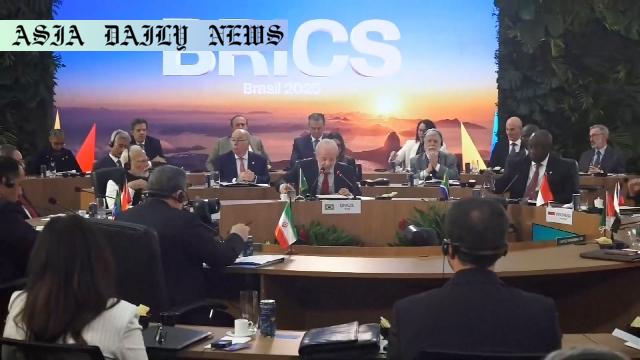Trade Tariffs: The proliferation of trade-restrictive actions threatens to further reduce global trade, says BRICS leaders.

Introduction: BRICS Summit’s Concerns on Global Trade
The recent BRICS summit, an event that gathers some of the most prominent emerging economies like Brazil, Russia, India, China, and South Africa, has taken a strong stance against trade-restrictive measures. Held in Rio de Janeiro, the summit was marked by stern warnings about the potential impact of the United States’ trade tariff policies, particularly under the administration of President Donald Trump. The leaders of the bloc emphasized that these policies are not only a threat to open trade but pose a risk to the global economic framework at large.
Criticism of US Trade Policy
The Brazilian government led the criticism, releasing a strong declaration following discussions among BRICS leaders. While the statement stopped short of explicitly naming the United States or President Trump, the implied reference was clear. Brazilian President Luiz Inacio Lula da Silva articulated fears about how these tariff policies undermine multilateral agreements, which have been foundational in fostering international trade and cooperation. He warned that these actions jeopardize ‘hard-won achievements,’ including climate and trade regimes, which are now under threat.
Absence of Key Leaders
Further complicating the summit’s narrative was the absence of Chinese President Xi Jinping and Russian President Vladimir Putin. While Xi sent a deputy in his place, Putin attended virtually due to other obligations. This lack of in-person representation from two of the bloc’s most prominent members led to skepticism over the summit’s effectiveness, with local media describing the gathering as ‘pointless.’ The absences have raised questions about how united the BRICS nations remain in addressing pressing global challenges.
The Broader Implications for Global Trade
The summit’s discussions come at a critical juncture for global trade. The proliferation of trade-restrictive measures, as highlighted by the BRICS leaders, threatens to significantly reduce global trade volumes. Such policies can lead to further isolationism, disrupt supply chains, and deepen economic inequalities. Historically, nations have achieved economic advancement through open trade regimes. However, protectionist actions like tariffs have the opposite effect, creating ripple effects across industries and countries.
The Role of BRICS in Countering Trade Challenges
BRICS has often positioned itself as a counterweight to the influence of Western economies, especially Europe and the United States. Both China and Russia have utilized the framework to challenge the dominance of Western-led economic approaches. However, the bloc’s ability to present a unified front, particularly in moments like these, is critical to demonstrating its relevance on the global stage. Despite internal differences and logistical challenges, BRICS has the potential to establish itself as a global advocate for trade inclusivity and economic multilateralism.
Conclusion: A Call to Action
The declarations made at the BRICS summit represent more than mere diplomatic rhetoric. They highlight a growing discontent with the protectionist trends currently dominating global trade policies. While the summit itself may have faced logistical setbacks and criticism, the issues raised by the participants underscore the significant challenges ahead for global trade. A concerted effort by global economies, including influential blocs like BRICS, will be required to ensure that the principles of multilateralism, inclusivity, and sustainability continue to underpin international trade.
Commentary
The Relevance of BRICS in Today’s Global Economy
The BRICS summit’s recent discussions around the challenges posed by trade tariffs offer an important lens into the current dynamics of global economics. As power shifts from traditional Western economies to emerging markets, the actions and responses of coalitions like BRICS matter significantly. Yet, this year’s summit has been marked by a mix of inherent challenges, internal conflicts, and a seeming lack of strategic cohesion. Does this undermine the group’s relevance in today’s volatile economic landscape?
Strength in Unity, or a Fractured Front?
When discussing the role of BRICS, one cannot ignore its foundational purpose: to unite emerging economies and create a balance against the influence of the West. However, the absence of key players like China’s Xi Jinping in person and Russia’s Vladimir Putin highlighted cracks in the bloc’s ability to act as a cohesive unit. This lack of representation—even in summits critical to worldwide trade discussions—raises questions about whether BRICS can provide a consistent and unified voice in global negotiations.
Prioritizing Multilateralism Over Protectionism
One of the major takeaways from the summit was its criticism of protectionist policies, such as the US tariffs under the Trump administration. While the statement refrained from direct naming, the implications were evident. Multilateral systems have historically facilitated economic growth and stability. A turn toward isolationism not only reverses progress made in global trade but risks creating long-lasting economic divides. Can BRICS lead the discussion on fostering open trade policies while addressing the inevitable challenges that come with it?
A Need for Proactive Engagement
Moving forward, BRICS needs to revisit its strategies and reaffirm its commitment to tackling global economic issues effectively. The declarations made at the summit, though relevant, need to be backed with concerted action and unity among member states. Only through proactive efforts can BRICS counter the current wave of protectionism and ensure that open trade regimes remain viable for future generations.


